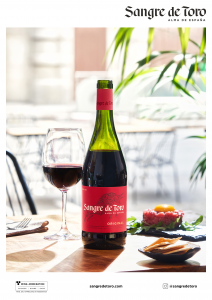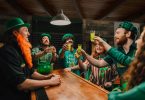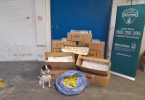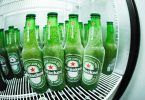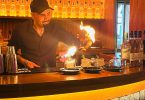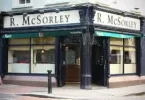Celebrating 200 years of Findlater & Co

The 200th birthday party for Findlater & Co in the RDS. Wine was a central part of the evening and guests were invited to try some of the company’s most prestigious wines
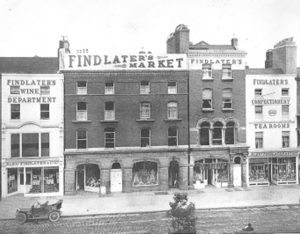 You know you are part and parcel of Dublin’s rich history when you are mentioned no once but on several occasions throughout Ulysses. James Joyce obviously thought a lot of the Findlater & Co wine merchants which was then situated at the top of Harcourt St when he used it as a landmark in his famous book. The company, which today represents prestigious wine and coffee brands such as Masi, Torres, Bolinger, Lavazza and Robert Roberts, celebrates 200 years in Ireland and although owned by Valeo Foods since 2014, the Findlater history is very important to the company and they celebrated it in style with a gala evening in the RDS back in September.
You know you are part and parcel of Dublin’s rich history when you are mentioned no once but on several occasions throughout Ulysses. James Joyce obviously thought a lot of the Findlater & Co wine merchants which was then situated at the top of Harcourt St when he used it as a landmark in his famous book. The company, which today represents prestigious wine and coffee brands such as Masi, Torres, Bolinger, Lavazza and Robert Roberts, celebrates 200 years in Ireland and although owned by Valeo Foods since 2014, the Findlater history is very important to the company and they celebrated it in style with a gala evening in the RDS back in September.

Richard Moriarty, Wine and spirits director of Findlater & Co at the company’s 200 year celebration in the RDS in September 2023
Richard Moriarty, the wine and spirit director of Findlater & Co conveys the importance of this rich history to the company when talking about the planning of the 200th birthday celebrations.
“We wanted to make the evening more interactive than a traditional sit down dinner so we created an area with a bar in the middle and food stations all around the edge,” he explains. “The idea was that you picked up a plate and you walked around and mixed with a host of different people and it worked really well.”
No surprise that wine was a central part of the evening and guests were invited to try some of the company’s most prestigious wines and it gave them a chance to showcase some of the newer varieties. Half way through the night while the guests mingled, the lights went out and drummers emerged in LED suits with base drums as a nod to the company being focused on the future.
In attendance on the evening were staff and colleagues, wine journalists, winery partners from around the world and some of Findlater’s key customers and by all accounts, it was a resounding success.
The start of it all
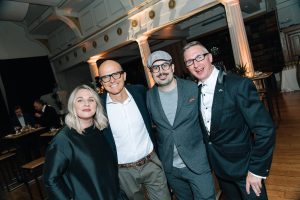
Richard Moriarty and the Findlater & Co team celebrate the company’s 200th anniversary
Moriarty stresses the fact that being in business for 200 years is an incredible feat. “This is a 200 year old company and I’m in charge of the wine side of the business and it really gave me a sense of don’t mess this up now. We want to be here for another 200 years. When myself and my team sat down to talk about how to celebrate this company, we looked at the past and the history and two things really stood out. Innovation was one as it started out as an import business and then moved into retail and now in its current iteration it’s a tea, coffee and wine distribution company. Innovation is the first strand we needed to celebrate and the second was its people. It’s the people that make a business,” he says.
There are 66 people working in the company today and they are moulding the business for the future, he explains. Moriarty himself has 30 years’ experience in the wine industry, having previously worked for Booker in the UK – part of the Tesco Group.
Quite astonishing is that a young Scottish man named Alexander Findlater started it all when he came to Dublin in 1923 to establish a wine and spirits import/export business on Burgh Quay.
“Alexander became famous for being a good bottler,” explains Moriarty. “He would have bought barrels of sherry and barrels of port and exported them abroad but he was a great business man and a shrewd operator.”
Give Wine a Future
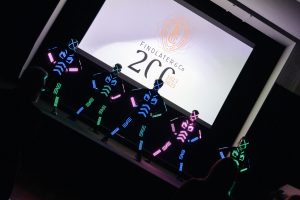
As a nod to the future of the company, LED dancers entertained guests as part of the 200th anniversary celebrations
While celebrating the past, they are very much looking towards the future and a big focus for the company is sustainability. They work with about 100 wineries across the globe from Spain to South America and Moriarty says that they are lucky that a lot of these wineries are doing fantastic projects around sustainability. “The problem we had is how do you talk to people about this,” says Moriarty. “Sustainability encompasses a huge amount from packaging materials to sustainable farming practices to thinner glass.
“We looked at sustainability and wondered what we could do so we coined the phrase Give Wine a Future. We take all the sustainability measures from our suppliers and talk to the trade about them. We talk to them about their wine lists and say you’ve got no sustainability measures on your wine list. You look at hotels and they have sustainability measures everywhere from their websites, to towels in the rooms, to explaining where the food comes from on restaurant menus. So everywhere in hospitality they talk about sustainability but they don’t talk about it in wine. So we are using Give Wine a Future to encourage restaurants to give customers a choice and help them explain why choosing a particular wine is better for the environment.”

Guests celebrating the company’s 200th anniversary
The company carried out a unique and first-in-the-industry tasting in the Shelborne Hotel in Dublin earlier this year to talk about sustainability in the wine industry.
Moriarty gives an example of a particular Masi wine that encompasses sustainability, called Fresco de Masi. “It’s organic, it’s biodynamic, it’s unfiltered, lightweight glass and it doesn’t have a plastic cap. All these kinds of modern cues are appealing to a different consumer than their more historic wines. This is much lighter and fresher,” he explains.
He believes that most wineries are looking at some sustainable practices but the problem with sustainability is that there are so many different accreditations around the world. “B Corp seems to be gaining worldwide recognition and we have four wineries we work with that are B Corp certified. That seems to be the gold standard in sustainability,” he says.
The next steps is to draw a line in the sand when they will ensure that all their supplying wineries must have some sustainable accreditation. “That will be at some point next year,” he promises. “Our coffee partners have the same sustainability principles”.
Women in wine

The Findlater team
Another strand to the business is an initiative called Women in Wine which aims to put the spotlight on the many women working in the industry and to encourage more women to join this traditionally male dominated space. “We’ve got really amazing female wine makers in our portfolio so we decided to highlight them in events during the year with tastings. We started the Women in Wine trade group and we sponsor a bursary to give further education to those who want to get into wine. Michelle O’Sullivan is our grocery wine director and she runs that. She’s brilliant,” he says.
Findlater & Co works with all of the main hotel and restaurants groups in Ireland and the company has two separate wine businesses, the hospitality business and the retail business. Moriarty explains how the supermarket business sells completely separate wines and a completely different portfolio to the hospitality side of the business. “If you have a wine in the supermarket you’d find it very difficult to sell it hospitality. You don’t see those brands on menus,” he states.
Consumption levels falling
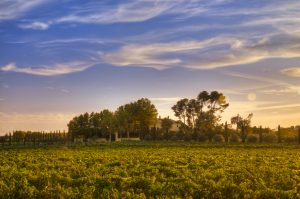
FINCA MAS LA PLANA
While all these great strides are being made in the industry, it’s surely sobering for them to admit that alcohol consumption levels are falling across the board as younger people are drinking less than the previous generations.
Moriarty says that this is something they accept and have to work around. “Younger people are choosing not to drink alcohol at all or drink less alcohol. And a lot of that is to do with their health. They don’t want to be waking up on a Monday feeling groggy. They are in gyms and more concerned with how they look.”
Consumption levels have been falling here since 2000. To counter this there is a lot of innovation around no and low alcohol brands and even more recently in mid-strength options due to the UK’s change in duty in August of this year. Moriarty explains what is happening: “The duty in the UK is now tied directly to alcohol volume, so the lower the alcohol volume, the lower the duty. So it’s opening up in the UK a whole load of brands with the likes of McGuigan 7%. It’s also about the whole issue of drinking in moderation as well. I’d love 7/8/9% wines to be a thing. When my children are of drinking age the message from me will be that drinking in moderation is a good thing. Binge drinking and being drunk is not good. It will be interesting to see if that taxation change will have an impact in the UK.”
According to Moriarty, one of their brands that has excelled in producing non-alcoholic wine is Torres with its product Natureo, which he says is the best non-alcoholic wine on the market. He explains the complicated process of making non-alcoholic wine. “You make the wine and then you take the alcohol out and that is an expensive process as it’s an extra step. It’s a spinning cone process where you separate the wine into different parts but you do lose some aromatics when you do it. Torres has been doing it the longest and I think they manage to make the best non-alcoholic wine on the market. We do a lot of blind tasting and it always outperforms everything else. They’ve perfected the process.”
Ireland as a test bed for Europe
The Irish drinks industry is dealing with a lot of legislative changes at present and Moriarty points out that we don’t see that happening in any other country in Europe. “We are dealing with health labelling issues, single unit pricing, restrictions on multi-buy promotions. Ireland is a real test bed for a lot of legislation that might come down the line in Europe. A lot like the smoking ban – we were the first in Europe to do it and now it’s widespread across Europe. I think there’s definitely something cultural about how we drink here and in the UK compared to most of Europe. In my opinion, legislative changes don’t change that cultural link that you have,” he says. The Irish drinks market is certainly robust and Alex Findlater definitely made a good punt on choosing to set up shop in Dublin in 1823.
A mausoleum in Harold’s Cross in Dublin houses the remains of members of the Findlater family, the most recent to be buried there in 2018, was also an Alex Findlater who was the last of the family to lead the wine merchants and retailing business. While the family are now gone, they have left behind a wonderful legacy and employees who are keen to keep the Findlater name going strong well into the future. Congratulations on 200 years!



